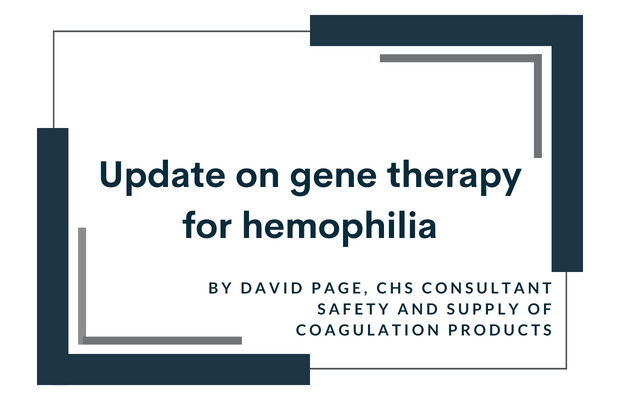
Montreal, August 10, 2023 – Gene therapies for hemophilia A and B continue to move closer to becoming reality.
Health Canada is currently evaluating two gene therapies for hemophilia B.
The first is etranacogene dezaparvovec, manufactured by CSL Behring and marketed in the U.S. and Europe as Hemgenix. A decision on approval in Canada could come as early as the fourth quarter of 2023. Hemgenix was approved by the U.S. Food and Drug Administarion (FDA) in November 2022 and by the European Medicines Agency (EMA) in February 2023.
Results from the Phase 3 HOPE-B study were published in the New England Journal of Medicine in February 2023 (1).
- There was a mean factor IX expression of 36.7% 24 months after administration.
- Fifty-two of 54 people in the trial had not returned to prophylaxis @ 24 months.
- Two of 54 people did not have an increase in factor IX levels (one had very high AAV-5 antibody levels and the other had a reaction during administration and received only a small portion of the dose).
- Eleven of 54 people experienced an increase in ALTs (liver enzymes).
- Nine of 54 people received steroids (average duration of 81 days) to combat rejection of the vector.
- There was no difference in factor IX response in those with pre-existing AAV-5 antibody scores of 1 to 700 score compared with those with an undetectable level of antibodies.
The second is fidanacogene elaparvovec, manufactured by Pfizer. This gene therapy is under review by Health Canada, the FDA and the EMA. A decision in Canada could come late in 2023 or early in 2024.
Safety and efficacy data from the Phase 3 BENEGENE-2 trial were presented at the recent Congress of the International Society of Hemostasis and Thrombosis (ISTH), held in Montreal in June.
- There was a mean factor IX expression of 27.8% 12 weeks after administration.
- Forty-one of 45 people in the trial completed 15 months of follow-up.
- The annual bleed rate decreased from mean 4.4 while on FIX prophylaxis to 1.3 (a 71% decrease).
- Twenty-nine of 45 people had no bleeds.
- Six of 45 people returned to factor IX prophylaxis.
- Nine of 45 people had factor IX levels below 5%.
- Twenty-eight of 45 people received steroids (average duration of 145 days) to combat rejection of the vector.
Both these gene therapies will be undergoing health technology assessments in the coming months by INESSS for Quebec and by CADTH for the rest of Canada. The Canadian Hemophilia Society is making submissions to present the patient perspective. Parts of the submissions will present the ideas expressed by the community in the summer 2022 survey on attitudes to gene therapy, and the current survey of the lived experience of those with hemophilia B. To participate in the survey, please click on the following link: www.surveymonkey.com/r/gene-therapy-FIX.
Meanwhile, Biomarin’s Roctavian, a gene therapy for hemophilia A, was licensed by the U.S. FDA in June 2023, after an earlier approval in August 2022 by the EMA. Biomarin has yet to file for approval in Canada. No one has been treated post-marketing in Europe; at least one person has been treated in the U.S.
The latest data on Roctavian, presented in June at the ISTH Congress, continue to show slowly decreasing FVIII expression from year to year and wide variability in response from person to person.
- At 36 months post-administration, the mean factor VIII level in the 132 trial subjects was 18.4%; the median factor VIII level was 8.3%.
- At 48 months post-administration (albeit in a smaller sample), the mean factor VIII level was 15.2%; the median factor VIII level was 7.4%.
- At 36 months …
- 6% of the 132 people had FVIII activity of ≥40% as per the chromogenic substrate assay
- 1% had FVIII activity of 5-40%
- 1% had FVIII activity of 3-5%
- 2% had FVIII activity of <3%.
- Seventeen of 132 people had returned to prophylaxis.
- There was an 82.9% drop in annual bleed rate @ 36 months.
- There was a 97% drop in FVIII usage @ 36 months.
(1) Gene Therapy with Etranacogene Dezaparvovec for Hemophilia B, Steven W. Pipe et al, N Engl J Med 2023; 388:706-718 DOI: 10.1056/NEJMoa2211644
KEYWORDS
ADVOCACY ageing A GLOBAL PERSPECTIVE AIDS CARRIERS CHS chapters Community COMPENSATION COVID-19 EMICIZUMAB GENE THERAPY HALF-LIFE FACTOR CONCENTRATES HEMLIBRA HEMOPHILIA A AND B HEPATITIS C HIV ICHIP INHIBITORS MYCBDR NURSING PHYSIOTHERAPY Platelet function disorders PROBE PROPHYLAXIS RARE BLEEDING DISORDERS RESEARCH SOCIAL WORK Tainted blood tragedy THE BLOOD FACTOR THE FEMALE FACTOR THERAPIES THE SAGE PAGE TWINNING VON WILLEBRAND DISEASE
Copyright © 2020 - Canadian Hemophilia Society. All rights reserved.




